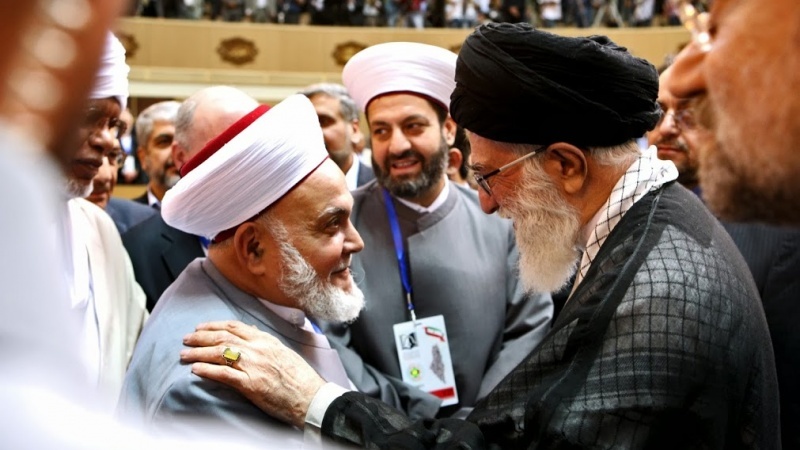Six of biggest lies, accusations against Shias in Sunni Muslims’ world
ParsToday - Some extremists accuse Shia Muslims of innovating in Islam. However, Shia Muslims believe in the fundamental principles of Islam such as Tawhid (oneness with God), Nabuwah (prophethood), and Ma'ad (resurrection).
Throughout history, some religious differences between Shia and Sunni Muslims have led to incorrect interpretations and rumors about Shia beliefs among Sunni Muslims. These misunderstandings and lies have been mainly promoted by extremist groups and do not reflect the general attitude of Sunni Muslims.
In the past two centuries, and especially in the era of media dominance, colonialism has played a key role in spreading these rumors and fueling hatred towards Shia Muslims in Sunni societies. This has been exacerbated by the emergence of Takfiri groups.
In this article by Pars Today, we will examine six of the biggest lies and accusations against Shia Muslims:
1. Altering the Quran: One of the most serious accusations against Shia Muslims is that they believe in altering the Quran. This claim is completely false; Shia Muslims, like Sunni Muslims, consider the Quran to be the word of God and unchanged, and adhere to it.
The belief in altering the Quran has no place in Shia theology, and Shia texts emphasize this. In Iran, the same Quran is available to everyone, and it is the same as the one found in Arab countries, Egypt, Indonesia, and Algeria. Many of the Quran copies are even imported from Sunni countries. Not a single word or letter is different.
2. Exaggeration about the Imams: Another accusation against Shia Muslims is that they exaggerate the status of the Prophet's household, particularly Imam Ali (PBUH) and other Imams from the Prophet's lineage, and consider them to be divine beings.
This misconception stems from a lack of understanding of the concept of "Wilayah" (guardianship) and the role of Imams in Shia theology. Shia Muslims consider the Imams to be infallible and pure, as stated in verse 33 of Surah Al-Ahzab: "Indeed, Allah intends to remove from you [O' Ahl al-Bayt] all [kinds of] impurities and to purify you with a thorough purification." However, they do not worship them as gods or divine beings. This lie has no basis in Shia theology.
3. Innovating in Islam: Some extremists accuse Shia Muslims of innovating in Islam. However, Shia Muslims believe in the fundamental principles of Islam, such as Tawhid, Nabuwah, and Ma'ad, and only differ with Sunni Muslims on some jurisprudential issues. These differences are based on the ijtihad (independent reasoning) of Shia scholars and do not mean adding innovations to the religion.
4. Seeking intercession from someone other than God: In Shia theology, seeking intercession (Tawassul) means using the Prophet Muhammad (PBUH) and the infallible Imams as intermediaries to get closer to God. Shia Muslims believe that seeking intercession from the Ahl al-Bayt is not a form of worship, but rather a means of seeking forgiveness and prayer from those who are close to God.
This practice has its roots in the Quran, where God says: "O you who believe fear Allah and seek the means [of approach] to Him" (Surah Al-Ma'idah, verse 35). Similarly, the Quran mentions the story of the sons of Prophet Jacob seeking intercession from their father to ask for forgiveness from God: "They said, 'O our father, ask forgiveness for us, for we were indeed sinful'" (Surah Yusuf, verse 97). These examples demonstrate that seeking intercession is not only permissible in Shia theology but also has a basis in the Quran and the history of the prophets.
5. Enmity and disrespect towards the companions of the Prophet: One of the most common accusations against Shia Muslims is that they consider the Companions of the Prophet (PBUH) to be enemies and show disrespect towards them. This lie is a deliberate attempt to create division. In reality, Shia Muslims believe that after the Prophet's passing, two groups emerged among the Companions: those who remained loyal and those who made decisions on their own.
Shia Muslims criticize certain actions of the latter group, but as Shia scholars from past to present, such as Imam Khomeini and Imam Khamenei, have stated, any form of insult to the second group is forbidden. However, it cannot be denied that sometimes a misguided or ignorant faction, under the name of Shia, may make an offensive remark in a gathering, and the enemies of Shia-Sunni unity use media distribution of that insult to attribute it to all Shia. From the perspective of all Shia religious authorities and scholars, insulting the Companions is not permissible.
6. Disrespect towards the wives of the Prophet: Another false accusation is that Shia Muslims show disrespect towards the wives of the Prophet (PBUH) and make false accusations against them. However, Shia Muslims respect the status of the Prophet's wives and do not believe in such accusations.
Differences in interpreting historical events do not mean disrespecting the personalities and status of the Prophet's wives in Shia theology. From a Shia perspective, the wives of the Prophet are considered "Umm al-Mu'minin" (Mothers of the Believers).
In conclusion, these accusations and rumors have been mainly promoted by extremist groups and media outlets, and many Sunni Muslims do not believe in them.
Key phrases: Who are Shia Muslims, Shia beliefs, differences between Shia and Sunni Muslims, Quran alteration in Shia theology, criticism of Shia Muslims
MG/UR



